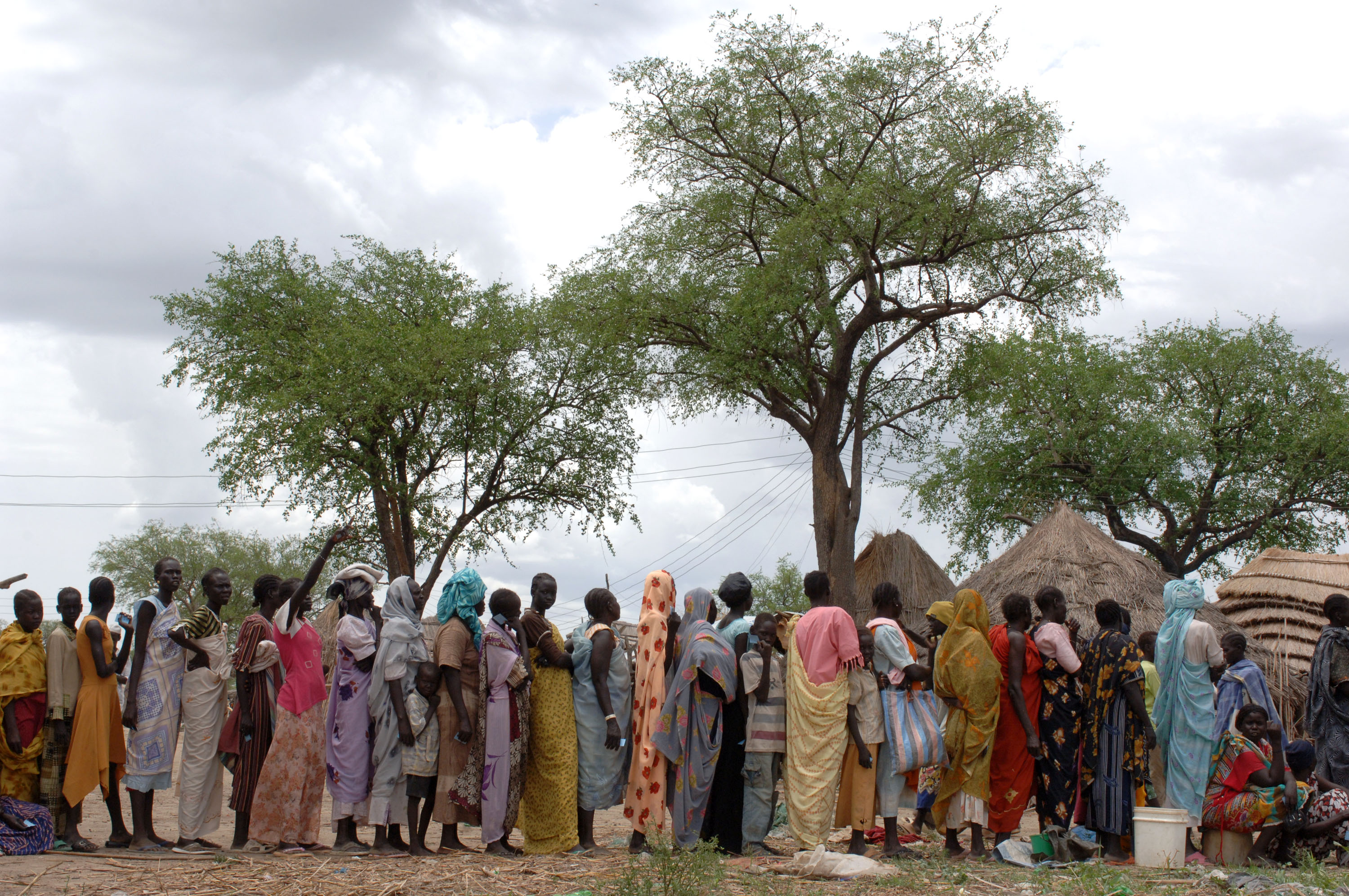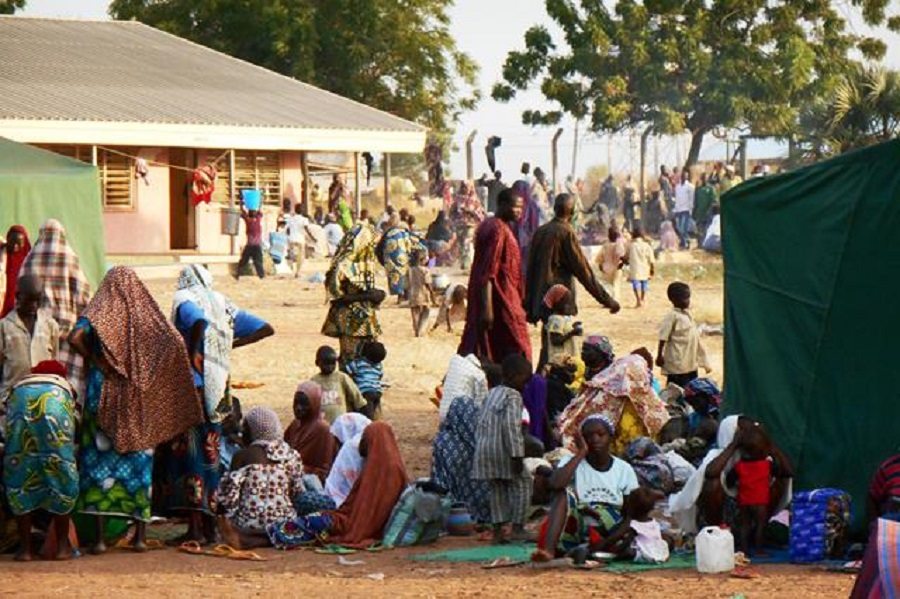Since losing their homes and source of livelihood for no reason of their own, the residents of IDP camps in most terror-hit Maiduguri have had to do menial jobs to support government’s effort but it is mostly the women and children who take up this task, Chika Mefor reports.
One peculiarity a first comer in Maiduguri metropolis notices is children from Internally Displaced Persons’ (IDP) camps either hawking or begging on the streets. While many people in the country worrying about the hot weather, these children, who mostly sell sachet water, take advantage of the weather to prowl the streets of the town, praying that they make enough sales that will help cater for their families. This is the story of many children whose families sought refuge in Maiduguri after being displaced by the dreaded boko haram sect.
Since 2009 when the extremist group struck, IDP camps have continuously sprung up in different parts of the Borno State’s capital and its environs, something residents feel will continue to happen unless the insurgents are totally annihilated.
Meanwhile as they wait for the day the insurgents will be removed from the surface of the earth, these displaced persons have to survive and their survival mostly falls on the shoulders of the children and their mothers.
Just three months ago, villagers of Dorom Baga, a community known for its fishing prowess, had to flee their lands after boko haram struck again. The villagers were happy to escape with their lives but have since had to face a life they never envisage they will face. When they arrived Maiduguri, they had nowhere to stay or a place to lay their heads but for the kind gesture of the renowned Bolori Family who gave them a piece of land to erect some shanties to live in.
“When I saw them in groups, I called them and asked what the problem was and they told me that they had no place to stay. So I told them I had an empty piece of land and asked if they were willingly to stay there. They accepted. They told me that they have no option. They needed a place to lay their head. That was how Doro Camp came to being. They have been here for three months now,” Muhammed Bolori, the owner of the piece of land narrated.
However, because the camp is not recognised by the government, the people rely on well-meaning Nigerians and NGOs for assistance. When an NGO, PagedInitiative visited the camp, it saw people whose lives were turned for the worse by the insurgents and who haven’t come to terms with what had hit them.
Fatima Ahmadu, a 40-year-old displaced person while narrating her ordeal stated that the insurgents turned their lives around and left them not just homeless but koboless.
A mother of 12 and 14 year old children, Fatima, who used to be a tailor and earning not less than N20,000 every month from her business now sits dejected outside her makeshift shanty, trying to make sense of what had befallen her and how to make life better for herself, her two children and her husband.
Alh Ahmadu, her husband, was a business man until they were displaced and now, he has nothing doing. It is a life they will not wish on their worse enemies. Fatima narrated that she and her family survive with the little money her children make out of selling sachet water.
“I send my children out to sell pure water and with the little money they make, we feed. My husband goes out to look for petty jobs but sometimes he comes back empty handed because there is no work. The children, however, come back home with something because the weather is hot and people will want to drink cold water,” she said.
Fatima confessed that she would have gone back to making clothes to support her family but she does not have her sewing machine anymore. According to her, she escaped the insurgents with nothing except the cloths she had on.
“When the gunmen showed up, I remember it was on a Friday, we had to escape. We escaped with nothing. My sewing machine and other properties that would have been of utmost help was left behind. We walked from Doro (Kukawa) to Monguno, a three day journey, before we could get a vehicle in Monguno that brought us to Maiduguri.”
With no other skills except being a tailor and with no sewing machine, Fatima can hardly continue her trade. She relies solely on her children to sell water so she can use the little profit they make to buy food for the family.
Fatima’s deepest worry is that most of the children in the camp will lose out on education if all they do is hawk during the day.
“When we were at home, I took their education seriously. Now they have to hawk. Even when they go to school, I don’t even know if they will concentrate in school,” she said as worried lines filled her already stressed face.
Adamu, one of the many children in the camp admitted that he attends the Islamic school close to the camp in the evenings but uses the mornings to sell water and other things. He however wishes for life to return to when he lived his simple life in his village.
“When we were at home, my father catered for our well-being. He was a fisher man and gets a lot of fish which we sell in the local market. Sometimes I go fishing with him when I get the chance. But now we have to find safety here in Maiduguri after boko haram attacked our village. Now, my father is jobless, apart from the petty jobs he gets to do sometimes,” he said.

Adamu, who is only 11, said he makes N400 to N500 when he sells well and N200 to N100 on days sales are very poor.
Life for pregnant Fahiza Daiyabu, also an IDP in the camp, is not easy but she does her best to use her skill to help her family. Fahiza, who is just 18, was married off to her current husband at the age of 15. She was a primary 6 drop out who was hurriedly married off by her parents because she wanted to elope with her childhood sweet heart.
“When my parents heard about my plans to elope, they married me off. There was nothing I could do. I had to agree to the marriage,” she said.
After marriage, Fahiza became a petty trader in her village before they were attacked. However, in the camp, she took up the skill of making fish nets. She explained that she collects N7 for each small net she makes.
“When I finish making them, I take them to the market; to those selling fishing materials. I wait for four days and then return to check if they have sold what I made,” she explained.
While her wares fetch even little money, Fahiza is particular about helping her sister who just gave birth two days before boko haram attacked the community.
“She is not strong yet with her baby so I try a lot to help her however I can,” she added.
While Fahiza’s mother helps with the family upkeep too with the proceeds from her craft; making of hand fan, Fahiza’s husband is in Jigawa, trying to see if he can get something to do to help feed his family.
“He went there to see if he can get something to do. He can’t take me there with him because right now, he doesn’t even have any accommodation. He is staying with a friend. He visits occasionally,” she said.
Many of the men in the IDP camp are yet to come to terms with what has befallen them. Many of them who are farmers and fishermen, with no other skill, are left handicapped and only wonder what to make of their lives leaving the women and children with the responsibility of their survival, a role they never fathom will fall on them.
Speaking to the chairman of the camp, Mallam Sule Baushe, on the situation of the camp and their survival, he agreed that it was very pathetic and worrisome.
“Since our arrival for the past three months, it is only one NGO that came to encourage our people to be patient with what God has ordained in our lives. That was followed by another NGO whose members were kind enough to share food stuff and other condiments for the people. Many other NGOs came and promised to come back and help us but never did. People in this camp now have to beg, especially the women, while their little children hawk to feed their family,” he narrated in agony.
Buashe lamented that before the attack, the male folk worked hard and were completely responsible for their families but since taking resident in the camp, the reverse has become the case. For men, who were known as fishermen and farmers back at home, the past three months have been a torture they hope will end soon.
“We are jobless. All we do is to sit down and wait for our wives and children to go out, beg and hawk to feed us. It is not easy of us too but we have to accept it because there is nothing we can do,” he lamented.
This situation was aptly captured by a documentary produced by PagedInitiative which was screened for the IDPs. The story featured four women; Halima Bukar, Ruth Stevens, Hadiza Mustafa and Hadiza Hamidu who defied all odds to make ends meet for the benefit of their families. With complete fortitude and resilience, these women subdued the trauma and grief and had work to carve a future not dictated by the insurgents. They took up work to fend for their respective families, something they would have abhored before the insurgents struck.
Most women in the Northeast are now doing their best to make their voices heard as they work towards fending for their children. However, the responsibility which also falls on the children is scary as many fear that more children will be on the streets hawking, instead of being in school.
“That is the situation we find ourselves. Many of these children will not go school. They usually ask: ‘if I go to school, what I will eat when I get back home?’ It is important that the government destroys the source of this problem which is boko haram because unless that is done, many more will be displaced and sent to the streets to fend for themselves and their families. It is pathetic but a reality. Something has to be done, and fast,” a journalist in Maiduguri who pleaded anonymity said.

